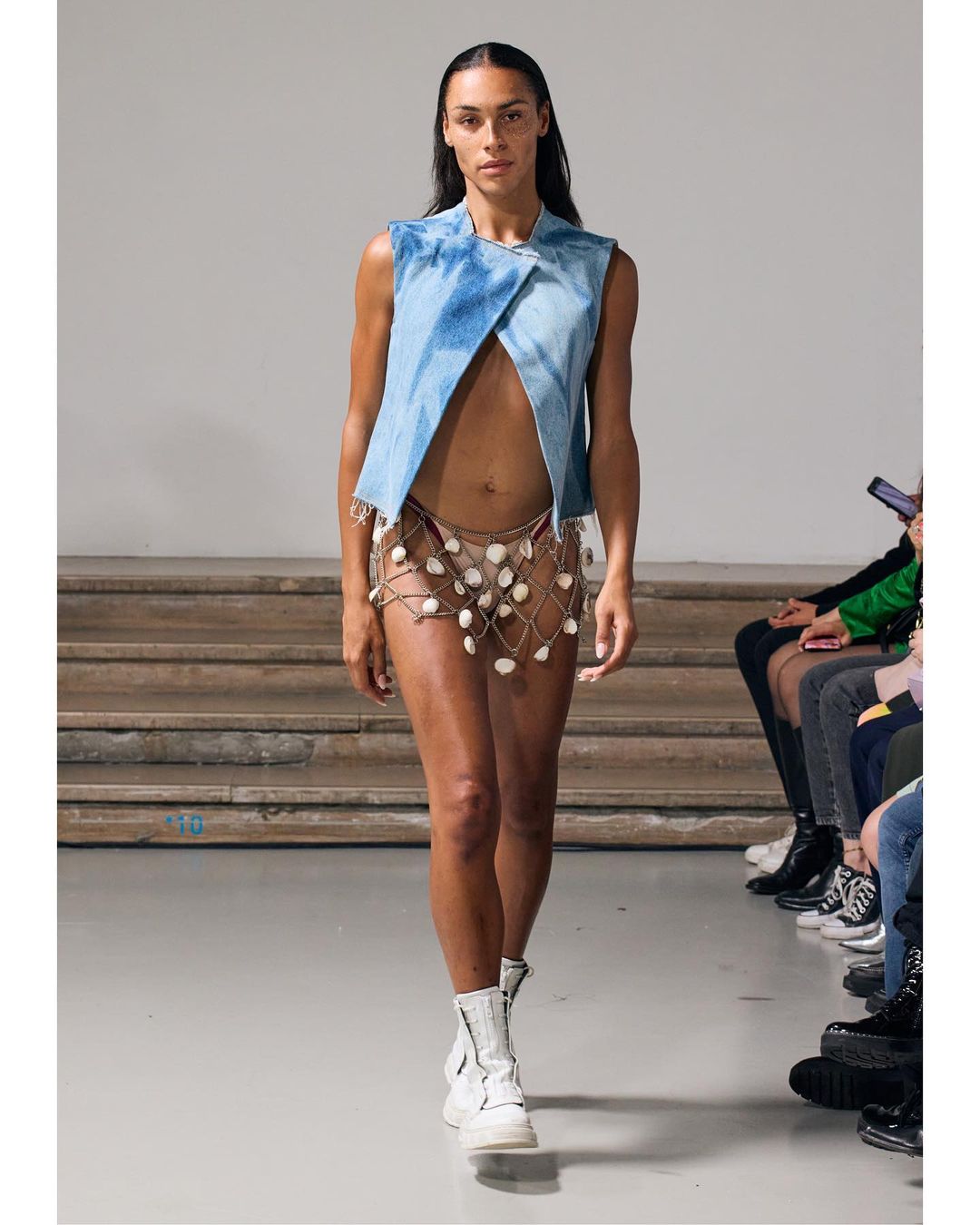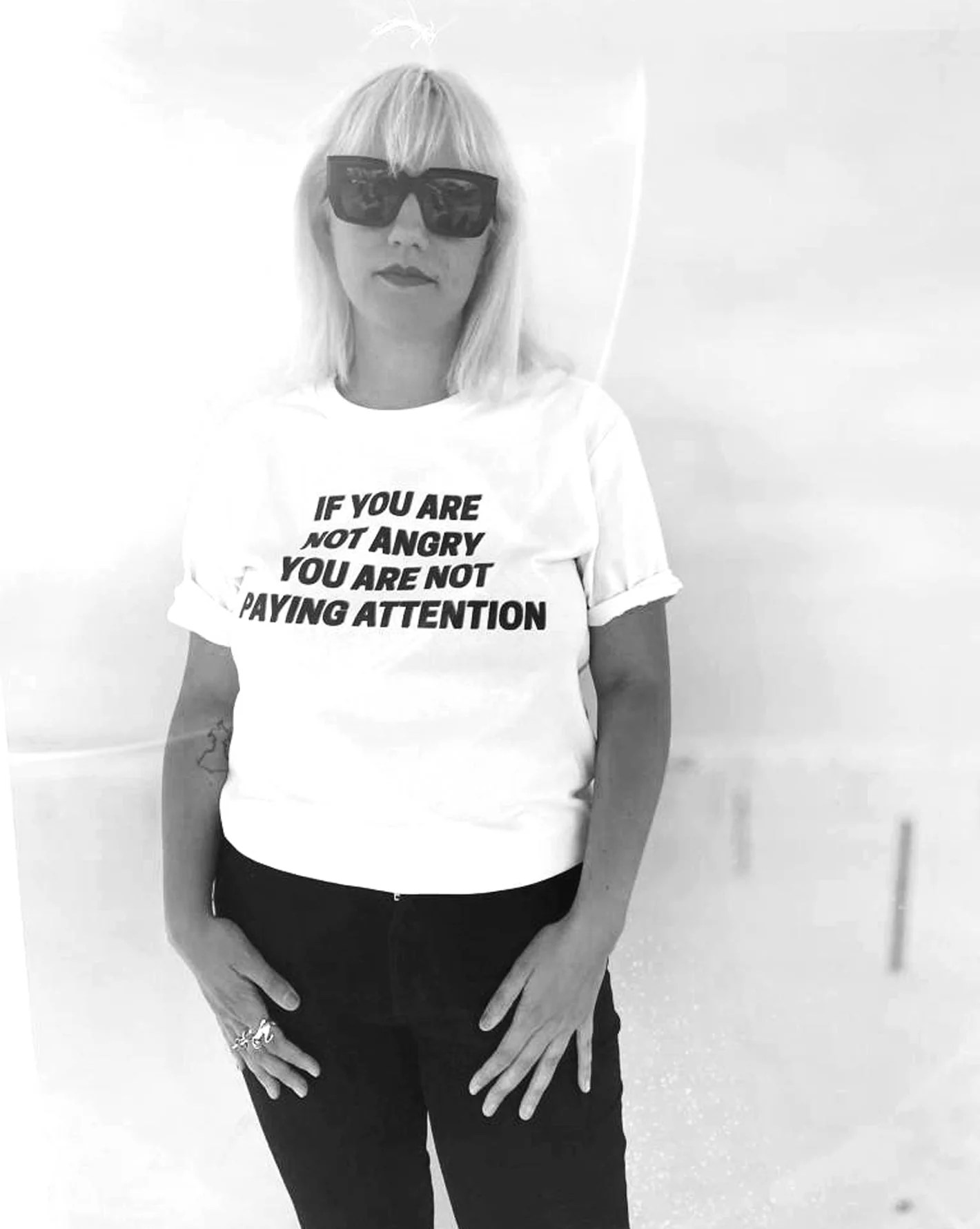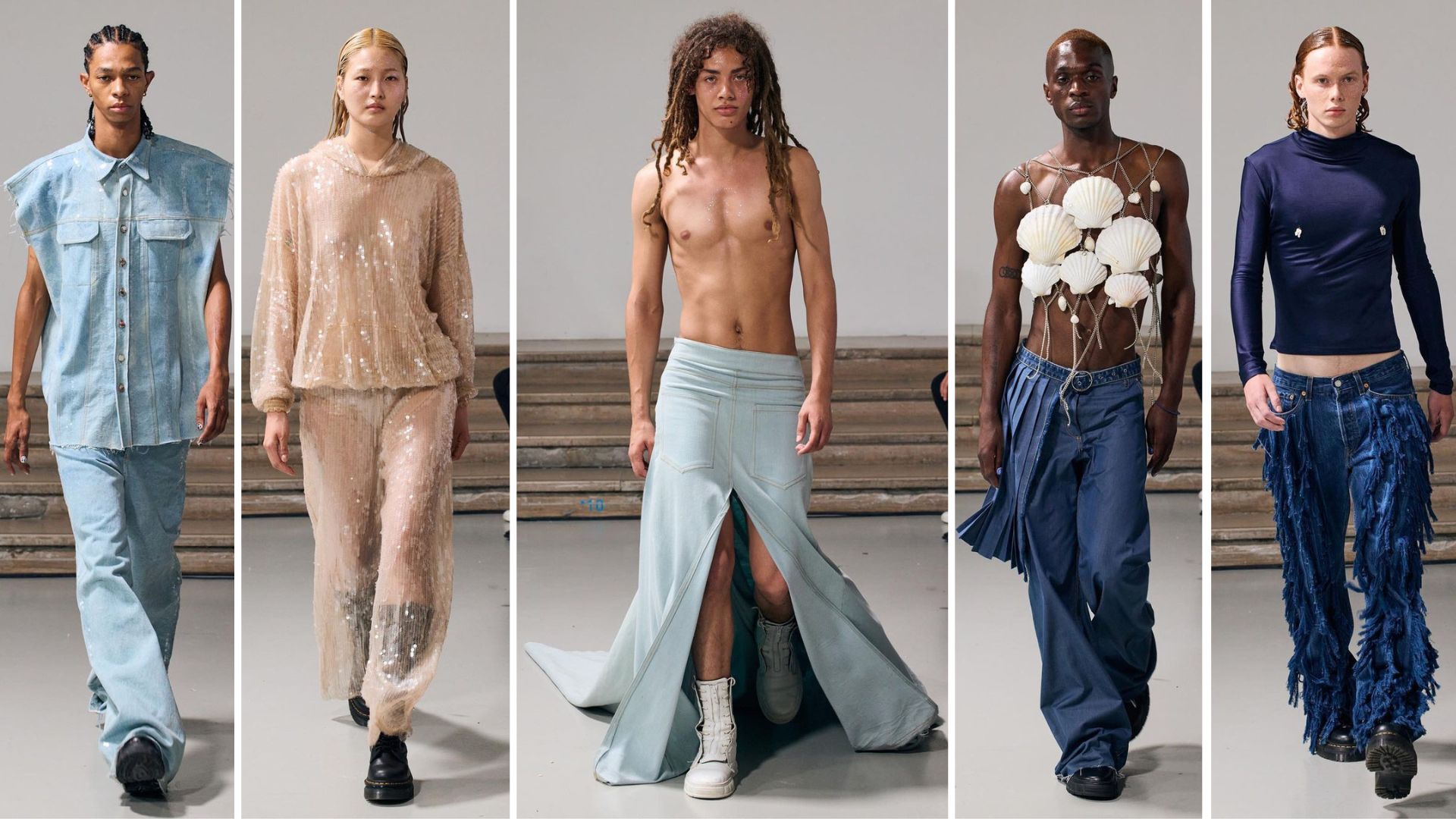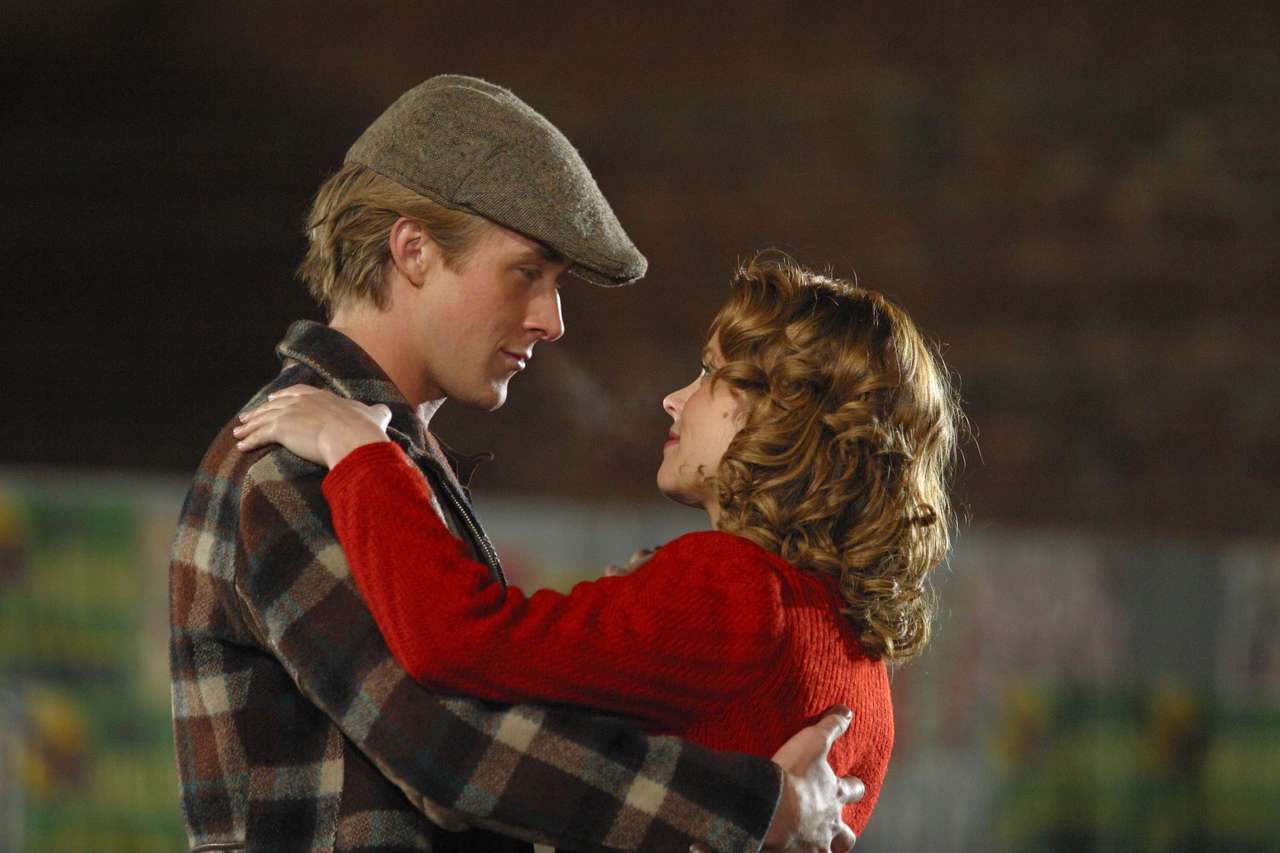Jeanne Friot is not afraid. Since 2020, she has taken her time to produce non-gendered and eco-responsible collections, Made in France, creative and busy. Using recycled materials, he thus redefines production methods, their rhythm and abolishes the boundaries between genres. A graduate of the Duperré School of Applied Arts and the Institut Français de la Mode, who has worked for APC, Maison Kitsuné, Wanda Nylon and Balenciaga, she now designs collections with her team from La Caserne, in Paris, the most important ecological accelerator dedicated to the fashion and luxury sector in Europe. Crossed during the Sphere showroom organized every season since 2020 by the Federation of Haute Couture and Fashion at the Palais de Tokyo to support young designers, Jeanne Friot says to miss his latest collection Sirens “, how fashion always reflects society and how it intends to change the system from within.

Interview with the busy young stylist Jeanne Friot
To miss. How do you introduce yourself?
Giovanna Friot. I have a fashion brand that bears my name. We make it non-genre, eco-responsible and Made in France. We launched in 2020, but this is the third collection that we truly present to buyers and marketable.
How does your eco-responsible commitment translate concretely into your fashion?
It’s crucial, I was wondering how to produce a young designer brand today and deconstruct all the designs we know from current fashion. We know that this industry is among the most polluting on the planet. How can we participate, change things in a sustainable way? How to deconstruct this system? That’s why I chose to work only with dead stockand think about a production made to order (made to order), do everything in France. This explains the final price of the parts. We do luxury upcycling, but it’s to get customers to come to us, and so far it’s been doing quite well.
How do you define the aesthetics of the brand?
A pure, radical, non-gendered and queer aesthetic.
How does queer infuse your creativity?
I am a queer person in a patriarchal society so this makes me look at society differently. Being a woman in an environment where most of the designers in positions of power in large groups are men. So it’s important for me to occupy this space, to spread the message that it’s possible to be there as a woman, on my behalf. May it help inspire little girls. I had no references of lesbian women in fashion. So I want to help open that door.

Did you fear that coming out as a lesbian stylist could hinder your career?
I was afraid of a knockback, that I am criticized for being radical, too feminist, too lesbian. But the products speak for themselves, and our interventions provide further interpretations for people who wish to take an interest in them. We can come only for aesthetics or also for substance. I think our way of communicating is not angry, we can be angry, but we produce sweet things. So it’s been received pretty well so far.
You have pieces that are more explicit than others, like the “If you’re not angry you’re not paying attention” t-shirt last year. And now write “no racism, no sexism, no homophobia”. Is it a bias to make your losing leaders political slogans?
It is part of our challenge to ensure that even our entry-level products, which we hope will afford a wider audience, such as t-shirts, caps or sweatshirts, still carry the brand’s DNA. So we find the same quality requirement (it’s cut from dead materials, silk-screened in Paris) and strong slogans encompassing our commitments. The t-shirt from the previous collection ” If you are not angry you are not paying attention was in partnership with The Frankie Shop and the proceeds went to the National Network of Abortions Funds (NNAF) to advocate for abortion rights following the repeal of Roe vs. Wading. Sold out in 2 hours and we managed to raise 25,000 euros. Other committed collaborations are arriving, always for the benefit of sector associations. It’s our way of balancing things a bit: if we happen to make more commercial pieces, we make sure they can serve an important cause.

What is the inspiration behind your most creative pieces for this new collection?
We started from The little Mermaid, a fairy tale by Hans Christian Andersen. Artist Benjamin Lacombe has recently reprinted it, illustrating it and including letters from the Danish author’s correspondence, to shed light on the queer dimension of this story. Andersen was in love with Edvard Collin, son of his patron, and began to write The little Mermaid the wedding day of the latter with Henriette Thyberg, and we can therefore read this story as a metaphor of her desire to transform herself in order to try to be able to live this impossible love. Many people can relate to this story. Today we can understand the details of this mermaid symbolism even better. I wanted this collection to be able to provide a restorative story at the end of this tale that it doesn’t havehappy ending in the real version. Maybe today this story could have a happy ending.
Our collections always resonate with what is happening politically in society. Last year it was abortion rights, this year it’s trans people being violently attacked, some in the US have to leave their homes, change states, they’re in exile. Drag queens’ rights are also under threat, particularly in Canada. Our queer stories get more complicated as they gain exposure.

Can you tell us about the materials used in this mermaid collection?
Some looks consist of recycled seashells, collected on the beach or set aside by the cooks for us. They have been reworked, cleaned, sanded, varnished. The result looks light, but easily weighs several kilos!
There are also jeans that have been recycled, hand washed and fully embroidered with PVC sequins to form vertical stripes. It gives a pearly finish, which can look wet in the distance, on these raw-hemmed, oversized jeans that look almost liquid. It is both casual and very couture.
How can fashion act politically for the rights of LGBT+ people?
I act by being visible, bringing our voices, talking about what’s wrong. We are very few women in positions of power in this industry, even fewer in being out as a lesbian. I know I’m not the only one. Fashion can be LGBT+ friendly some aspects, but the reality turns out to be quite different. It is very difficult to survive there as a minority person without being essentialized, especially if you have little financial means to begin with. Many power relations come into play and complicate the trajectory of queer, racialized, precarious, etc. people. I know there are other women in leadership positions who are lesbians in fashion, but they don’t say so and I can understand their reasons. I have no advice to give them, everyone gets by as he wants and can. I also open it for those of today who hesitate and those after. I hope to help pave the way for many of us to follow.
Do you like our articles? You will love our newsletters! Sign up for free on this page.
The latest articles on
fashion industry
-
Who is Jeanne Friot, a young lesbian designer with recycled, gender-neutral and committed fashion
-
Prada official partner of the Chinese women’s soccer team: a good sign for all female soccer players?
-
Counterfeit Vinted: How to Avoid Counterfeit Branded Shoes & Sneakers on Vinted, etc.
-
Eva, 24 years old, €3,500 in annual spending: “My parents think I have a problem: I’m a compulsive buyer”
-
Are our clothes slowly poisoning us?
-
How the OMÔL brand dresses Made In Africa
Source: Madmoizelle
Mary Crossley is an author at “The Fashion Vibes”. She is a seasoned journalist who is dedicated to delivering the latest news to her readers. With a keen sense of what’s important, Mary covers a wide range of topics, from politics to lifestyle and everything in between.




